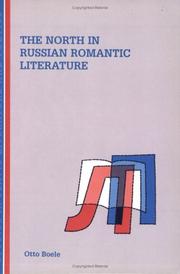| Listing 1 - 10 of 17 | << page >> |
Sort by
|
Book
ISBN: 9780299232740 0299232743 9780299232733 0299232735 Year: 2009 Publisher: Madison
Abstract | Keywords | Export | Availability | Bookmark
 Loading...
Loading...Choose an application
- Reference Manager
- EndNote
- RefWorks (Direct export to RefWorks)
Banned shortly after its publication in 1907, the Russian novel Sanin scandalized readers with the sexual exploits of its eponymous hero. Wreaking havoc on the fictional town he visits in Mikhail Artsybashev's story, the character Sanin left an even deeper imprint on the psyche of the real-life Russian public. Soon "Saninism" became the buzzword for the perceived faults of the nation. Seen as promoting a wave of hedonistic, decadent behavior, the novel was suppressed for decades, leaving behind only the rumor of its supposedly epidemic effect on a vulnerable generation of youth. Who were the Saninists, and what was their "teaching" all about? Delving into police reports, newspaper clippings, and amateur plays, Otto Boele finds that Russian youth were not at all swept away by the self-indulgent lifestyle of the novel's hero. In fact, Saninism was more smoke than fire--a figment of the public imagination triggered by anxieties about the revolution of 1905 and the twilight of the Russian empire. The reception of the novel, Boele shows, reflected much deeper worries caused by economic reforms, an increase in social mobility, and changing attitudes toward sexuality. Showing how literary criticism interacts with the age-old medium of rumor, Erotic Nihilism in Late Imperial Russia offers a meticulous analysis of the scandal's coverage in the provincial press and the reactions of young people who appealed to their peers to resist the novel's nihilistic message. By examining the complex dialogue between readers and writers, children and parents, this study provides fascinating insights into Russian culture on the eve of World War I.

ISBN: 9004647937 9051839944 Year: 1996 Publisher: Amsterdam : BRILL,
Abstract | Keywords | Export | Availability | Bookmark
 Loading...
Loading...Choose an application
- Reference Manager
- EndNote
- RefWorks (Direct export to RefWorks)
This book explores the North in Russian romantic literature as a symbol of national particularity. It largely ignores the vogue of Ossian, being primarily concerned with the significance of the North for Russia's national self-image. The author demonstrates how, starting with Lomonosov, the North initially functions as a symbol of Russia's 'new' European identity. Gradually it acquires a different ideological charge, giving voice to growing resentment over the inroads of western culture. By the turn of the century, the North no longer denotes Russia's supposed Europeanness, but its 'unique national' spirit, believed to have been polluted by the slavish imitation of the West. By this time, the theme of winter was discovered as an appropriate vehicle for the expression of nationalist sentiments, culminating in the popular myth of the winter of 1812 as an ally of the Russian people. This study also investigates the theme of 'northern homesickness' as opposed to the lure of the South and concludes by examining the national stereotypes of Russia's northern neighbours, the Swedes and the Finns.

ISBN: 9789004647930 9789051839944 Year: 1996 Publisher: Leiden ;Boston Brill
Abstract | Keywords | Export | Availability | Bookmark
 Loading...
Loading...Choose an application
- Reference Manager
- EndNote
- RefWorks (Direct export to RefWorks)
Book
ISBN: 9789061434702 906143470X Year: 2020 Publisher: Amsterdam Pegasus
Abstract | Keywords | Export | Availability | Bookmark
 Loading...
Loading...Choose an application
- Reference Manager
- EndNote
- RefWorks (Direct export to RefWorks)
Dissertation
Year: 1996 Publisher: Groningen : Rijksuniversiteit Groningen,
Abstract | Keywords | Export | Availability | Bookmark
 Loading...
Loading...Choose an application
- Reference Manager
- EndNote
- RefWorks (Direct export to RefWorks)
Book
ISBN: 3031698169 9783031698163 Year: 2024 Publisher: Cham : Springer International Publishing AG,
Abstract | Keywords | Export | Availability | Bookmark
 Loading...
Loading...Choose an application
- Reference Manager
- EndNote
- RefWorks (Direct export to RefWorks)
This book examines the consumption and influence of Russian literature from 1980 to 2024, focusing on how literary works have shaped memory and identity. Edited by Otto Boele and Dorine Schellens, the volume explores themes of literary production and consumption during significant transitional periods in Russia, such as the post-Soviet era. It delves into the effects of social and political changes on literature, including the emergence of feminist and LGBTQ+ narratives in the digital sphere. The book is intended for scholars and students of Russian literature and cultural studies, offering insights into how literature reflects and impacts societal shifts.
Book
ISBN: 902841617X Year: 1993 Publisher: Amsterdam : Wereldbibliotheek ; Kapellen : Nederlandsche Boekhandel
Abstract | Keywords | Export | Availability | Bookmark
 Loading...
Loading...Choose an application
- Reference Manager
- EndNote
- RefWorks (Direct export to RefWorks)
Dissertation
Year: 1996 Publisher: Amsterdam : Rodopi,
Abstract | Keywords | Export | Availability | Bookmark
 Loading...
Loading...Choose an application
- Reference Manager
- EndNote
- RefWorks (Direct export to RefWorks)
Book
ISBN: 903512748X Year: 2004 Publisher: Amsterdam Bert Bakker
Abstract | Keywords | Export | Availability | Bookmark
 Loading...
Loading...Choose an application
- Reference Manager
- EndNote
- RefWorks (Direct export to RefWorks)
Russian literature --- brieven (genre) --- Diaghilev, Sergei
Book
ISBN: 9789061434597 Year: 2019 Publisher: Amsterdam Pegasus
Abstract | Keywords | Export | Availability | Bookmark
 Loading...
Loading...Choose an application
- Reference Manager
- EndNote
- RefWorks (Direct export to RefWorks)
| Listing 1 - 10 of 17 | << page >> |
Sort by
|

 Search
Search Feedback
Feedback About UniCat
About UniCat  Help
Help News
News